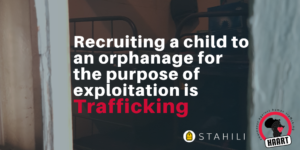Let’s Call it What it is: Orphanage Trafficking

By Michelle Oliel of Stahili and Sophie Otiende of HAART.
One of Kenya’s leading newspapers, the Daily Nation, recently reported a story of a Dutch national with previous convictions for sex offences who has been charged with sexually abusing and assaulting young girls in a Kenyan orphanage which he had himself established.
As outrageous as it sounds, unfortunately this case is not unique. Nationals from a number of countries have either been accused of or convicted for sexual crimes against children in orphanages in Kenya and in other parts of the world. There is a general perception that orphanages are places of safety for vulnerable children. However, reports like this and others show that orphanages can indeed be sites of child trafficking – both to them and from them.
The Daily Nation report refers to several other cases where orphanages have been sites of sexual abuse by foreigners. However, child trafficking to orphanages is not limited to foreign nationals or to sexual exploitation. Hidden behind the doors of many so-called “orphanages”, children have been recruited and exploited for forced labour and forced begging, among other criminal acts. They are sometimes forced to perform ritual dances and songs for foreign visitors – as well as visitors from closer to home – and engage in other activities deleterious to children’s health and well-being.
In this latest case, the Dutch national is reported to have “…duped the children’s mothers that he would sponsor their education in his ‘school’”. It is a well-known fact that the majority of children residing in orphanages have living parents or families. In this case, the man took the girls away from their mothers to his orphanage in a rural area and exploited them for sexual purposes. He has been charged with the crime of defilement. However, looking more closely at the nature of his alleged crimes, it appears that prosecutors have missed one important thing: the Dutch national could be a human trafficker.
Under Kenyan law, child trafficking is the recruitment of children for the purposes of exploitation. When it comes to orphanage trafficking, this involves the recruitment of children from families and communities into institutions, often called orphanages, but also children’s homes or care centres, for the purposes of exploitation.
Although alarm bells have been rung regarding this case and others, no person has so far been prosecuted under Kenyan law for the trafficking of children to orphanages, according to publicly available information. This is due, in part, to the lack of general awareness of the crime of trafficking, and orphanage trafficking in particular. At the same time, many argue that proving the intention to exploit is a difficult burden to meet.
The facts presented by the Daily Nation suggest that the Dutch national who recruited the girls may have had the intention to recruit them for the purposes of sexual exploitation. He was previously convicted and served a sentence in the Netherlands for sexual crimes and was charged with the “defilement” of three girls at Donholm Estate in Nairobi in 2002. He is also alleged to have posted “amateur videos of minors dancing and posing suggestively, including in a bedroom” on his YouTube channel. Though he has been released on bond, the outcome of the latest case remains to be seen. The case is due to be heard in April.
It is important to mention that the government of Kenya has committed to important care reforms for children. In 2017, a moratorium was placed on the establishment of new orphanages in Kenya, commonly known as Charitable Children’s Institutions (CCIs). At the same time, careful planning for the closure of orphanages and transition to alternative family-based forms of care is underway. Preventing family separation and strengthening families will be part of these reforms and will help curb the problem of institutionalisation which leaves children vulnerable to abuse and exploitation.
In the meantime, those who seek to recruit children to or from orphanages for the purposes of exploiting them must be prosecuted under counter-trafficking laws. We must also begin calling this crime what it is: child trafficking.
To learn more visit www.haartkenya.org and www.stahili.org.
One Reply to “Let’s Call it What it is: Orphanage Trafficking”
Comments are closed.
I feel sad because Child trafficking is a practice that has been going on locally for many years. I still recall how I had to work for my provision, doing a 8-5pm job just to survive in the Orphanage, I did mot know otherwise. I felt exploited, never experienced child hood and when I could take it no more I left to find a life outside that enclosure, I was done !
It Has shocked me to learn what Child trafficking is in regards to CCI. Many are going through thesame and I am really hoping to have a way to reach out and make it different for them.
If only the communities around understood the harm this Institutions are doing to their children. I hate orphanages and nothing will ever justify their existence as a positive phenomenal.